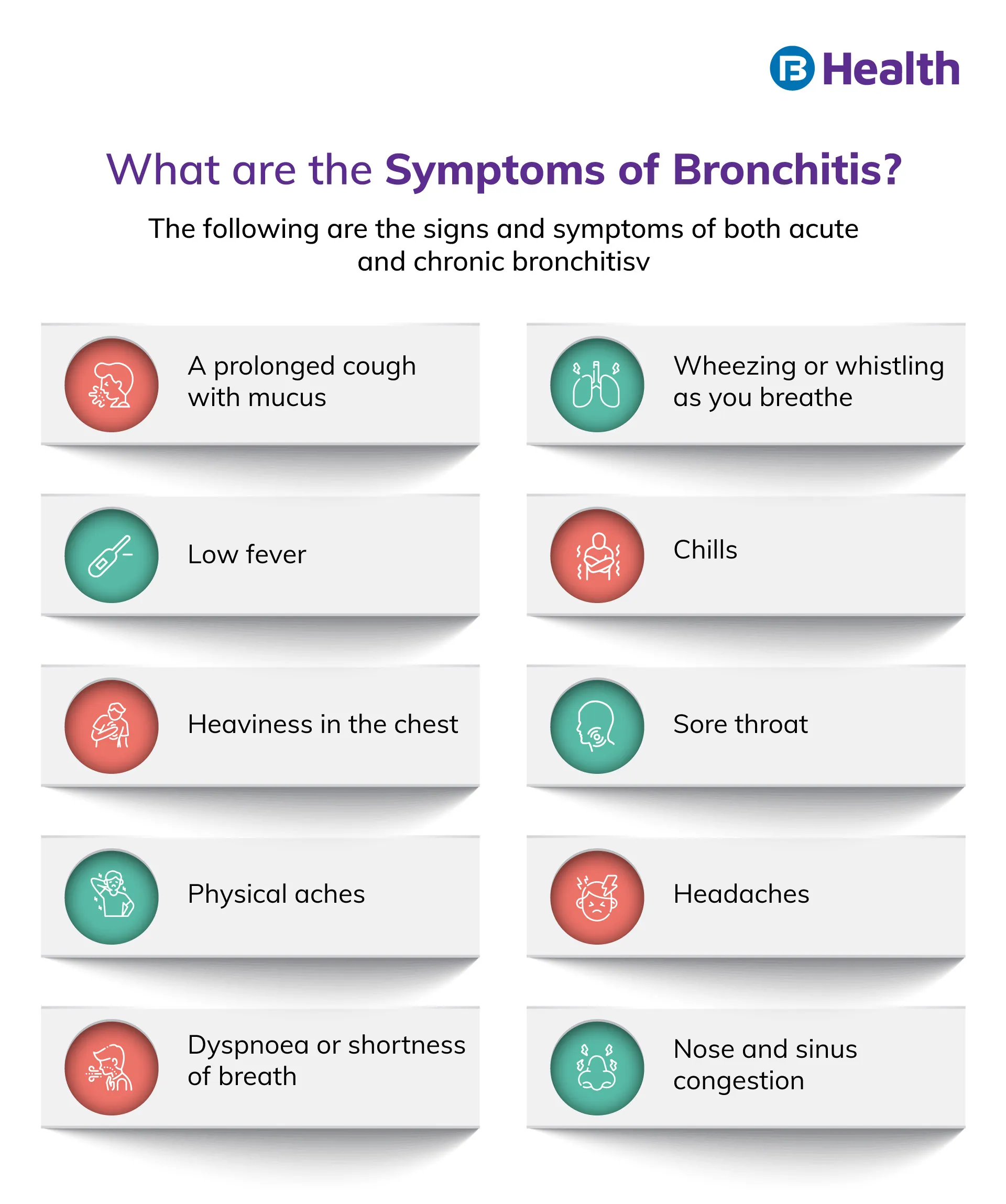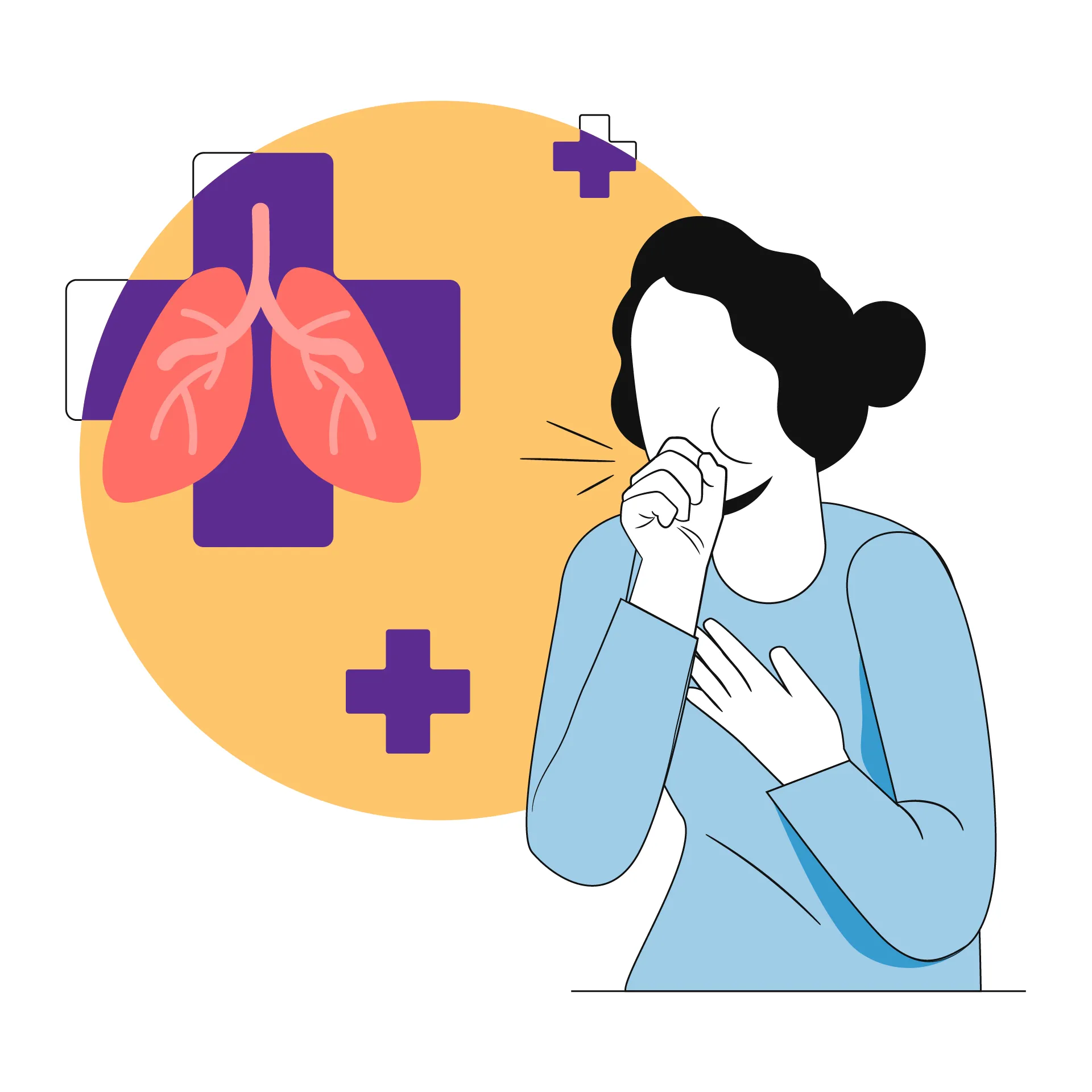General Health | 7 min read
Bronchitis: Meaning, Type, Causes, and Treatment
Medically reviewed by
Table of Content
Synopsis
is characterised by inflammation and enlargement of the bronchial tubes, causing cough and excessive mucus production. Dealing with bronchitis is annoying, to put it mildly. The cough might feel endless, even after the other cold symptoms have subsided. This blog discusses everything you need to know about bronchitis and how to cope with it.
Key Takeaways
- Bronchitis occurs when bronchi are inflamed and swell, resulting in cough and congestion
- Acute and chronic are the two types of bronchitis. Acute bronchitis is more common
- Avoiding triggers like smoking, irritants, dust, pollen or pets to reduce the possibility of bronchitis
What is Bronchitis?
Bronchitis occurs when the bronchial tubes turn inflamed and enlarged, resulting in persistent cough and mucus. Cough can last from a few days to a few weeks, and it may be difficult to breathe due to the congestion. Most cases of bronchitis can be traced back to an initial infection in the sinuses, ears, or throat. When the infection reaches the bronchi (the large and medium-sized airways of the lung), it can cause serious problems.
Types of Bronchitis
Two types of bronchitis are acute and chronic.
Acute bronchitis
This type of bronchitis is more common. Acute bronchitis lasts for a set period of time. Symptoms last a few weeks, but it rarely causes difficulties after that.
It frequently resembles a viral infection, such as a cold or the flu, and the same virus may cause it.
Chronic bronchitis
This bronchitis type is a little more serious. It either returns or does not go away.
Chronic bronchitis has symptoms similar to acute bronchitis but is a long-term sickness.
If a person has chronic bronchitis, they experience cough for at least three months of the year, for two or more years in succession.
According to the National Library of Medicine, it is classified as a kind of chronic obstructive pulmonary disease (COPD) in which the bronchial tubes create a lot of mucus. [1]
According to the Centers for Disease Control and Prevention (CDC), a person who develops emphysema alongside chronic bronchitis will be diagnosed with COPD. This is a dangerous and potentially fatal condition. [2]
When your body fights the pathogens, bronchial tubes enlarge and produce more mucus. That means you have fewer openings for air to move through, which can make breathing hard.
Additional Read: World COPD Day
Bronchitis Symptoms
- A prolonged cough with mucus
- Difficulty breathing
- Wheezing or whistling as you breathe
- Low fever
- Chills
- Heaviness in the chest
- Feeling tired
- Sore throat
- Physical aches
- Dyspnoea or shortness of breath
- Headaches
- Nose and sinus congestion
- Runny nose
Acute bronchitis symptoms will disappear, but chronic bronchitis symptoms can frequently reoccur. Irritation is common for many people during the cold months, which is why bronchitis and winter rashes usually spike during that time.
However, it is not the only illness that causes a cough. A persistent cough could indicate lung cancer, asthma, pneumonia, or other illnesses. Anyone who has a persistent cough should get a doctor's consultation.Bronchitis Causes
Acute bronchitis is caused by the following:
- A virus, such as a cold or flu virus
- A bacterial infection
- Exposure to irritants such as tobacco smoke, dust, fumes, vapours, and air pollution
Chronic bronchitis causes include the following:
- Recurrent inflammation and damage to lung and airway tissues
- Breathing in air pollution and other substances that irritate your lungs, such as chemical fumes or dust, over time
- Long periods of smoking or inhaling second-hand smoke
Other plausible causes of bronchitis include the following:
- Long-term environmental exposure to air pollution, dust, and fumes
- Genetic variables
- A history of respiratory disease or gastroesophageal reflux disease, as well as recurring bouts of acute bronchitis (GERD)
- Pesticide exposure may increase the risk
Bronchitis Diagnosis
First, a doctor will perform a physical examination and use a stethoscope to listen for unusual lung noises. After that, the doctor may prescribe certain tests to be done.
Although there is no particular testing for bronchitis, you may be tested for other illnesses. Among the possible tests are the following:
- Sputum swab: Your doctor may put a soft-tipped stick (swab) in your nose to test for viruses. The nose swab is then sent to the lab for analysis
- Chest X-ray: If your cough persists, you may need a chest X-ray to rule out more serious diseases. Your doctor will use a machine to take photos of your heart and lungs
- Pulmonary lung function test: If your doctor suspects you have chronic bronchitis, they may use a machine to assess how effectively your lungs work. Other tests, such as the lung diffusion test, can be performed to check how well gases are being exchanged, and a lung plethysmography test can also be done to assess the condition of the lungs
- Blood tests: Your doctor may do blood tests on you using a needle in your arm to check for infections or your overall health and assess your oxygen levels
Risk Factors for Bronchitis
- You are a smoker
- You suffer from asthma and allergies
- Your immune system is compromised. This is sometimes true for older persons, people with chronic conditions, and babies and small children. A cold can increase your chances because your body is already fighting microorganisms
- You have a history of lung disease in your family
Bronchitis Prevention
- If you or someone else is unwell, try to avoid being around them. This is especially true during winter when people tend to congregate indoors
- Smoke and other irritants should be avoided
- Avoid any triggers if you have asthma or allergies (including pets, dust and pollen)
- Start a humidifier. Air that is moist is less prone to irritate your lungs
- Get enough rest
- Maintain a nutritious diet
- Hands should be washed often with soap and water. If soap and water aren't available, use an alcohol-based hand sanitiser
- Make sure your flu and pneumonia immunisations are up to date
Bronchitis Home Remedies
Eating honey:
Two spoonfuls of honey may help relieve cough symptoms.
Using a humidifier:
This can help to release mucus, increase airflow, and alleviate wheezing.
Doing proper exercises:
Exercising can help develop the chest muscles in order to improve breathing.
Practising breathing exercises:
These exercises, such as pursed-lip breathing, can assist slow down and improve the effectiveness of breathing.

Bronchitis Treatment
Your doctor is unlikely to recommend drugs to treat your bronchitis. In some circumstances, you can take drugs to alleviate symptoms or address the underlying problem, such as:
Antiviral medicines
If the flu causes your bronchitis, your doctor may prescribe an antiviral drug such as Tamiflu®, Relenza®, or Rapivab®. If you begin taking antivirals as soon as your symptoms appear, you may feel better sooner.
Bronchodilators
If you're having problems breathing, your doctor may prescribe a bronchodilator (a medication that helps open your airways).
Anti-inflammatory medications
To minimise inflammation, your doctor may give corticosteroids and other drugs.
Cough relievers
A lingering cough may benefit from over-the-counter or prescription cough suppressants (antitussives). Dextromethorphan (Robitussin®, DayQuilTM, PediaCare®) and benzonatate (Tessalon Perles®, ZonatussTM) are examples.
Antibiotics
Antibiotics will most likely not be prescribed for bronchitis treatment unless your doctor suspects a bacterial infection.
Treatment for COPD/asthma
Your clinician may prescribe extra drugs or breathing treatments for chronic bronchitis if you have COPD or asthma.
Mucolytics
It helps loosen or thin mucus in the airways, which enables patients to cough up phlegm more easily.
Oxygen therapy
In severe circumstances, a person may require additional oxygen to help them breathe.
When Should You See a Doctor?
It is usually treatable at home with rest, anti-inflammatory medicine, and plenty of fluids. However, if a person has any of the following symptoms, they should consult a doctor:
- Persistent or worsening cough that lasts more than three weeks
- A fever that lasts for more than three days
- Blood in the mucus
- Rapid breathing
- Chest pains
- Fatigue or disorientation
Anyone with a pre-existing lung or heart issue should consult a general physician if they develop bronchitis symptoms.
It leads to airflow blockage and breathing problems. Acute bronchitis is a common illness that can be uncomfortable, but it usually goes away on its own within a few days. At the same time, chronic bronchitis is a more serious long-term illness. Smokers who continue to smoke may develop increasing symptoms, emphysema, and COPD. All of these illnesses can be fatal.
Anyone concerned about bronchitis symptoms should consult a doctor. To make this process easier, get an online doctor consultation, where you can talk to a doctor about any health issue from the comfort of your home. Visit Bajaj Finserv Health for more information or read more such blogs.
References
- https://www.who.int/news-room/fact-sheets/detail/chronic-obstructive-pulmonary-disease-(copd)
- https://www.cdc.gov/copd/index.html
Disclaimer
Please note that this article is solely meant for informational purposes and Bajaj Finserv Health Limited (“BFHL”) does not shoulder any responsibility of the views/advice/information expressed/given by the writer/reviewer/originator. This article should not be considered as a substitute for any medical advice, diagnosis or treatment. Always consult with your trusted physician/qualified healthcare professional to evaluate your medical condition. The above article has been reviewed by a qualified doctor and BFHL is not responsible for any damages for any information or services provided by any third party.





